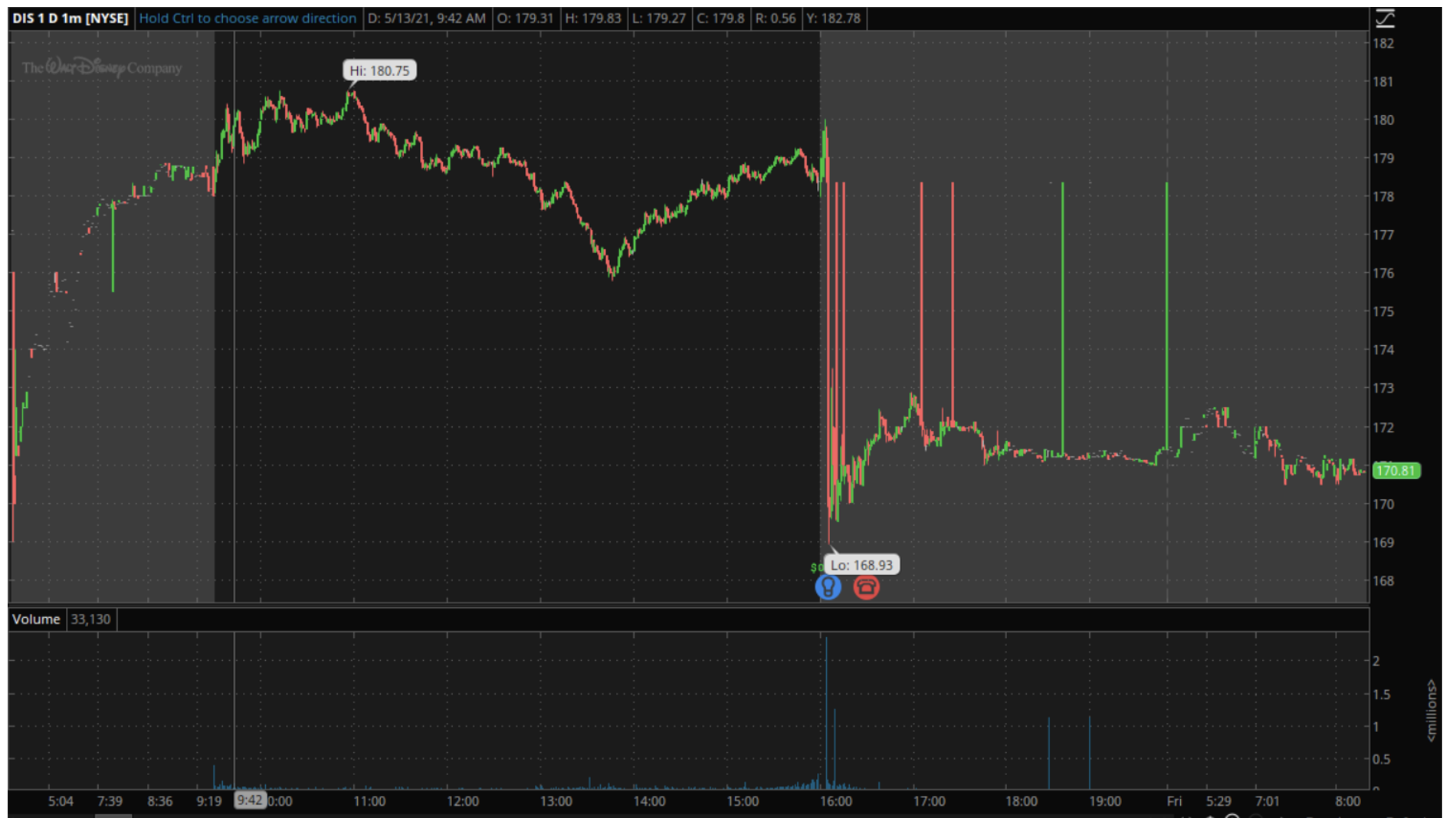Earnings season for Q1 2021 results is nearly over and so far, there has been one notable thing about this quarter: Reactions to earnings that seem to defy logic are not uncommon, but this season has seen a lot of that. Sometimes there are obvious reasons for that logic-defying move elsewhere in the release, such as lower guidance or a big miss on a closely followed growth metric despite an upside EPS surprise, but sometimes the “illogical” reaction is harder to justify.
The former is the case this morning with shares of Disney (DIS), where a miss of expectations on the revenue side and subscriber growth have overshadowed a big beat of expected profits:

As you can see, the reaction to earnings after the bell yesterday was swift and decisive. DIS dropped around five percent and is still trading at around those levels this morning. That will have mystified some, given that the headline EPS number was so spectacularly good. The entertainment and media giant reported earnings of $0.79 per share, a massive beat of the $0.31 consensus forecast. The focus of traders, however, was elsewhere. They saw that, but also saw a miss on revenue and, probably more worrying to them, a miss on the rate of growth of subscriptions to Disney+.
As I said, this “drop on a beat” wasn’t too hard to understand, but it still fits the pattern of this quarter, where negative reactions to earnings reports, burdened by the weight of excessive expectations and high whisper numbers, are exaggerated after any miss, even concerning relatively minor misses in less important metrics. Given the overall trend this season, that is clearly what is happening here.
Obviously, Disney+ has been a resounding success, and has been a major contributor to profitability during the pandemic for a company whose lines of business include movies, theme parks and a cruise line, all of which were shut down completely for a while and are still shunned by a lot of safety-conscious Americans.
The problem is that Disney+ has become a victim of its own success. They did add subscribers last quarter, 8.7 million of them to be exact, but that takes them to 103.6 million in total, or about one third of the population of the United States. Even with international exposure, growth from there has to slow down. So, if you regard Disney+ as the future of the House of Mouse, a 5% or so drop in the stock seems logical enough on weaker than expected subscriber growth.
However, there is another way of looking at Disney+. Maybe it is not the future of the business on which everything depends, but rather is a convenient cash-flow and profit bridge while so much of the business has been shut down. Yes, it can add cash flow and expand reach, but is still an add-on, not its entire business. Looked at from that perspective, continued growth in streaming, even if it is slower than expected, is a bonus, and other news that broke yesterday will be far more impactful in the coming weeks, months, and even years.
The CDC’s guideline change that says that vaccinated people no longer need to wear a mask for most indoor activities is a major step towards the normalization of our lives and is potentially far more impactful for DIS than a slightly disappointing growth rate for a subscription service. Movies will debut at theaters again, cruises will restart, and hotels and theme parks will bounce back to somewhere approaching capacity. No matter what the texture of last quarter’s earnings, those are the things that will drive DIS once the current disruption is over.
I would give one word of warning here, though. In many cases this quarter, the negative impact of these perceived “weak” earnings releases has continued for a few days as the selling prompts more selling, and analysts adjust their forecasts for next quarter lower. That means that it may pay to wait for a day or two before jumping in, but if there is evidence of a bounce back in today’s market, I would buy anyway. Whether it is today or after a few days, though, the longer-term positive news will easily outweigh the short-term negatives and DIS looks set to bounce back strongly after this drop.
Do you want more of Martin? If you are familiar with Martin’s work, you will know that he brings a unique perspective to markets and actionable ideas based on that perspective. In addition to writing here, Martin also writes a free weekly newsletter with in-depth analysis and trade ideas focused on just one recently underperforming sector that is bouncing fast. To find out more and sign up for the free newsletter, just click here.
The views and opinions expressed herein are the views and opinions of the author and do not necessarily reflect those of Nasdaq, Inc.

